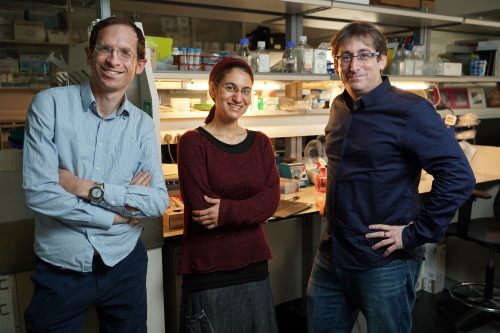The method, developed at the Rappaport Faculty of Medicine at the Technion and Stanford University, will allow the identification of patients at risk and the personalization of treatment for patients with chronic diseases

Researchers from the Technion and Stanford University developed a method to estimate the age of the immune system and showed that this is an index that predicts mortality in older people. The research published in the journal Nature Medicine was led by Prof. Shay Shen-Or, PhD student Ayelet Alpert and Dr. Yishai Pickman from the Rapport Faculty of Medicine at the Technion, in collaboration with other researchers from the Technion and Prof. Mark Davis from Stanford University, an expert in immunology and the director of ITI - the Institute for Transplantation and to infections at Stanford.
During a person's life, the immune system is subject to a slow and constant functional withdrawal, accompanied by an increase in inflammatory processes in the body. This phenomenon is called inflammaging - a combination of the words inflammation and aging. The aging of the immune system has devastating consequences, including impairment of the older person's ability to deal with infections and an increased risk of contracting chronic diseases such as cancer and heart disease - the main causes of death in old age.
The aging of the immune system is a well-known phenomenon, but its quantitative characterization is a complex challenge that requires multidimensional monitoring over time. The reason for this is that the immune system is a very complex system, influenced by genetic factors and constantly changing due to health conditions and external factors that the person is exposed to during his life. Since each person has a different genetic background and health and environmental history, the rate of immune aging varies from person to person; Some people have immune systems that age quickly, while others enjoy a youthful immune system for years.
Many studies have attempted to quantitatively characterize the changes in the immune system over the years, but their success was limited to a short monitoring period or to only a few aspects of the immune system. As a result, until today the medical community has not been able to fully map the laws of variation of the immune system and accurately define a person's immune age.
This is where the new monitoring system developed by the researchers at the Technion and Stanford comes into play. Once a year, for 9 years, the system characterized the immune system of 135 healthy people of different ages. This is how the researchers characterized the changes in the immune system over the years and built a model quantifying these changes in the specific person. These data allowed the researchers to quantitatively define the immune age in the IMM-AGE score index, which is based on many components of the system. This index provides, regarding the immune system, information that chronological age cannot provide.
Using the new method, the researchers quantified the immune age of more than 2,000 older people who participated in the Framingham study, which has been taking place near Boston for more than 50 years. By analyzing the data collected on this large sample, the researchers showed that advanced immune age predicts mortality at an older age beyond the known risk factors; In the same age group, people with an older immune system are subject to a higher mortality risk than people with a young immune system.
According to Prof. Shen-Or, "The index we developed provides a good estimate of the immune age in an aging person, and we believe it will provide new and extensive information on the state of the immune system at all stages of life. The immune age is a kind of biological clock that will help the medical authorities to identify at an early stage the immune deterioration (Immunosenescence) that occurs in old age, and now we are trying to define preventive measures that will reduce morbidity and mortality in old age. Since the immune age is also influenced by genetics, we can characterize the immune age of populations with a genetic tendency to longevity, for example descendants of people who have passed the age of 100 (Centenarians), and thus possibly characterize genes that affect the immune age. In addition, the method we developed will allow the identification of lifestyles, habits and medications that affect the immune age positively or negatively."
According to Prof. Shen-Or, "The research was made possible thanks to the interdisciplinary ecosystem that exists in my laboratory. Medicine in the 21st century is becoming an interdisciplinary science, which is why we opened a multidisciplinary program at the Faculty of Medicine for outstanding students, which is precisely its purpose - to train students in a broad and in-depth manner in order to move medicine forward as in this research."
The research was supported by grants from the American Institutes of Health (NIH), the Ellison Foundation, the Howard Hughes Institute, the National Institute of Allergy and Infectious Diseases and grants from the following Israeli organizations: the Israel Science Foundation, the Rapaport Institute and the Kolk Family Award.

One response
Pretty!